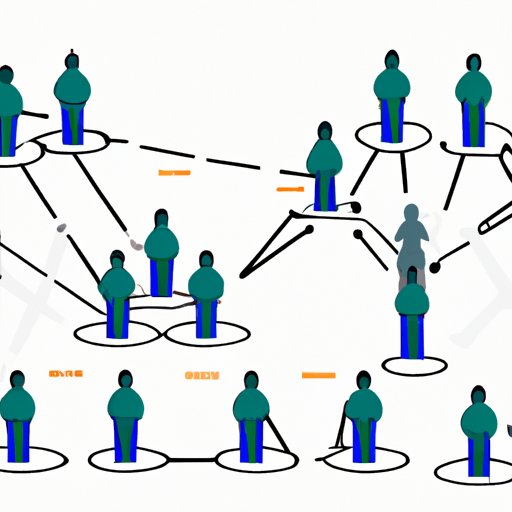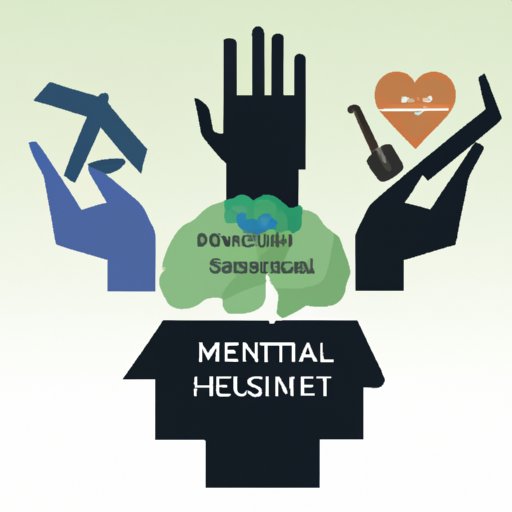Introduction
Mental health is an important part of our overall health and wellbeing. It affects how we think, feel, and act. It also helps determine how we handle stress, relate to others, and make choices. People who are mentally healthy are in control of their thoughts, feelings, and behaviors. Unfortunately, mental health issues can be difficult to recognize and even harder to talk about. That’s why it’s so important to understand what good mental health looks like and how to seek help if needed.

A. Definition of Mental Health
Mental health is defined as a state of well-being in which an individual realizes his or her own abilities, can cope with the normal stresses of life, can work productively, and is able to make a contribution to his or her community. Mental health includes our emotional, psychological, and social well-being. It affects how we think, feel, and act. It also helps us to cope with stress, overcome challenges, and make meaningful contributions to our communities.
B. Overview of Mental Health Challenges
Unfortunately, many people struggle with mental health issues at some point in their lives. These issues can range from mild anxiety to severe depression. Mental health disorders are often caused by a combination of biological, psychological, and environmental factors. Symptoms can include changes in mood, personality, or behavior that interfere with daily life.
I. Physical Health Implications
A. The Link Between Physical and Mental Health
There is a strong link between physical and mental health. When we neglect our mental health, it can have a negative impact on our physical health. Poor mental health can lead to increased risk of physical illness, such as heart disease, diabetes, and obesity. Mental health issues can also worsen existing physical health problems and lead to poorer outcomes.
B. Physiological Impact of Mental Health Issues
Mental health issues can also cause physiological changes in the body. For example, depression can increase levels of cortisol, the stress hormone. High cortisol levels can lead to weight gain, fatigue, and other physical symptoms. Anxiety can also cause physical symptoms such as racing heart, sweating, and difficulty breathing.

II. Relationships and Social Connections
A. Mental Health’s Influence on Personal Relationships
Mental health also affects our personal relationships. It can be difficult to maintain relationships when we are struggling with mental health issues. We may become withdrawn and isolated, which can lead to loneliness and further mental health issues. On the other hand, positive relationships can provide much needed support and help us cope with mental health challenges.
B. Mental Health’s Influence on Professional Relationships
Mental health issues can also affect our professional relationships. We may struggle to focus or perform at our best when dealing with mental health challenges. This can lead to strained relationships with coworkers, supervisors, or clients. It can also lead to job loss or career stagnation.

III. Work Performance and Productivity
A. How Mental Health Impacts Job Performance
Mental health can also have a major impact on job performance. Poor mental health can lead to absenteeism, reduced productivity, and difficulty meeting deadlines. It can also lead to increased errors and safety risks. All of these can have a negative effect on job performance.
B. Strategies for Improving Work Productivity
Fortunately, there are strategies that can help improve work productivity and reduce the impact of mental health issues. These include establishing a consistent routine, taking regular breaks, limiting distractions, setting achievable goals, and getting adequate rest. Practicing self-care and seeking professional help can also be beneficial.
IV. Coping With Stress and Adversity
A. Mental Health’s Role in Stress Management
Mental health plays an important role in stress management. People who are mentally healthy are better able to manage stress and cope with adversity. They are also more likely to recognize signs of stress and take steps to reduce its effects. This can include relaxation techniques, exercise, or talking to a friend or professional.
B. Mental Health’s Role in Overcoming Adversity
Mental health can also help us to overcome adversity. People who are mentally healthy are better able to face challenges and adapt to change. They are also more likely to seek out help and support when needed. This can be invaluable when dealing with difficult situations.
V. Overall Well-Being
A. Mental Health and the Ability to Live a Fulfilled Life
Mental health is also essential for overall well-being. People who are mentally healthy are better able to enjoy life and pursue their dreams. They are also more likely to make meaningful connections with others and find purpose in their lives.
B. Self Care Practices That Support Mental Health
Self-care practices can also support mental health. These include physical activity, healthy eating, getting enough sleep, and engaging in activities that bring joy. Taking time to connect with nature, practice mindfulness, and express gratitude can also be beneficial. These activities can help us to maintain a sense of balance and fulfillment.
VI. Seeking Help
A. Benefits of Seeking Professional Help
It’s important to seek help if you are struggling with mental health issues. Professional help can provide support, guidance, and coping strategies that can help you to manage your mental health. It can also provide an opportunity to explore underlying issues and learn new skills for managing stress and improving relationships.
B. Resources Available for Mental Health Support
There are many resources available for mental health support. These include counseling and therapy, medication, support groups, and online resources. It’s important to find the right resources for your needs and to be patient and persistent in your search for help.
VII. Stories of Hope
A. Inspiring Stories of People Who Have Overcome Mental Health Challenges
Finally, it’s important to remember that recovery is possible. There are countless inspiring stories of people who have overcome mental health challenges. These stories provide encouragement and hope that recovery is possible. They also remind us that we are not alone in our struggles.
B. How These Stories Provide Encouragement and Hope
These stories can provide much needed encouragement and hope. They remind us that we can get through difficult times and that recovery is possible. They also help us to remember that no one is perfect and that everyone struggles at times.
Conclusion
of Mental Health’s Importance
In conclusion, mental health is essential for overall well-being. It affects how we think, feel, and act. It also impacts our physical health, relationships, work performance, and ability to cope with stress and adversity. It’s important to recognize the signs of mental health issues and to seek help if needed.
B. Final Thoughts on Taking Steps Towards Mental Health Recovery
Recovery is possible. It’s important to take steps towards recovery, such as seeking professional help, practicing self-care, and connecting with supportive people. It’s also important to remember that no one is perfect and that everyone struggles at times. Stories of hope and resilience can provide much needed encouragement and remind us that we are not alone.
(Note: Is this article not meeting your expectations? Do you have knowledge or insights to share? Unlock new opportunities and expand your reach by joining our authors team. Click Registration to join us and share your expertise with our readers.)
